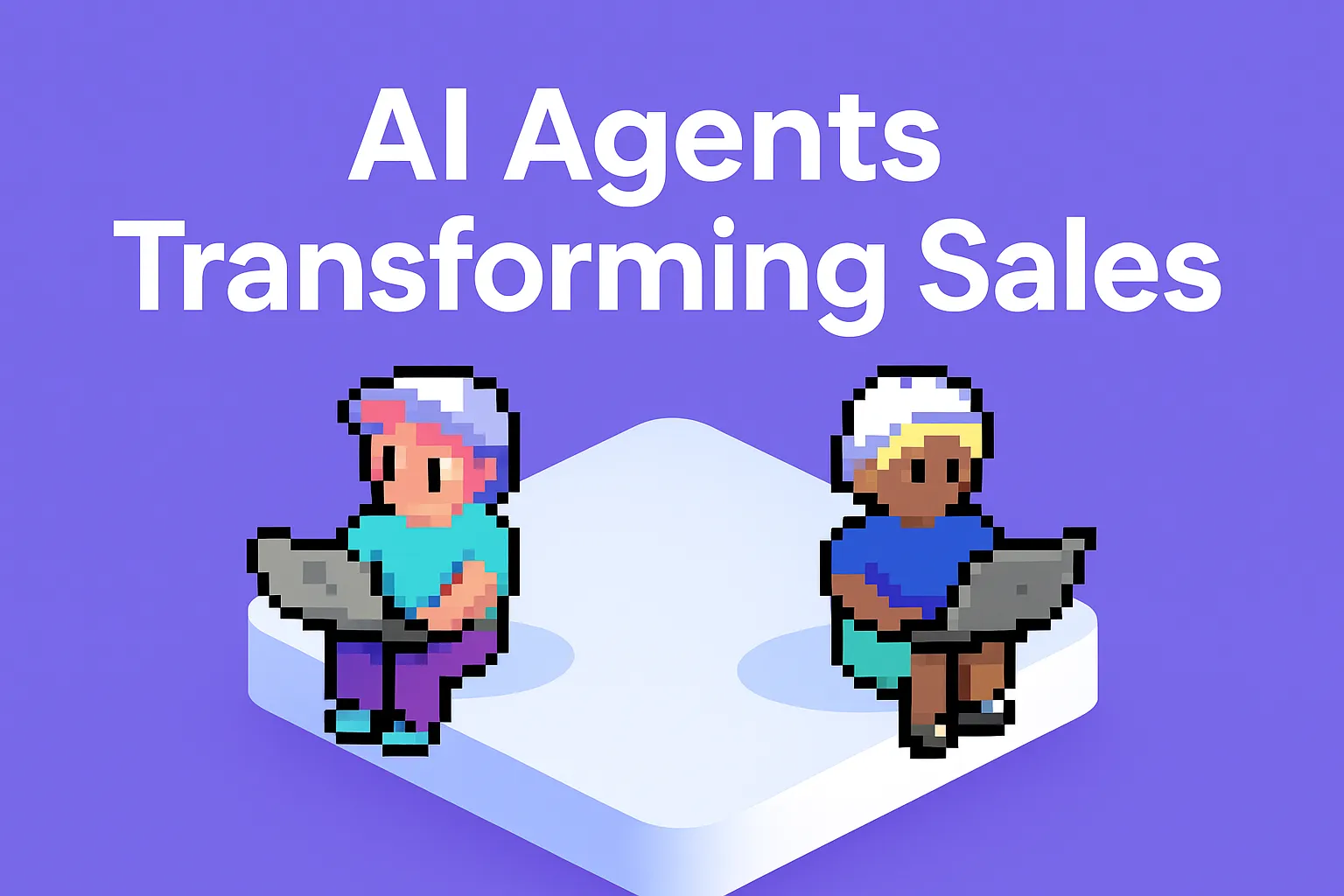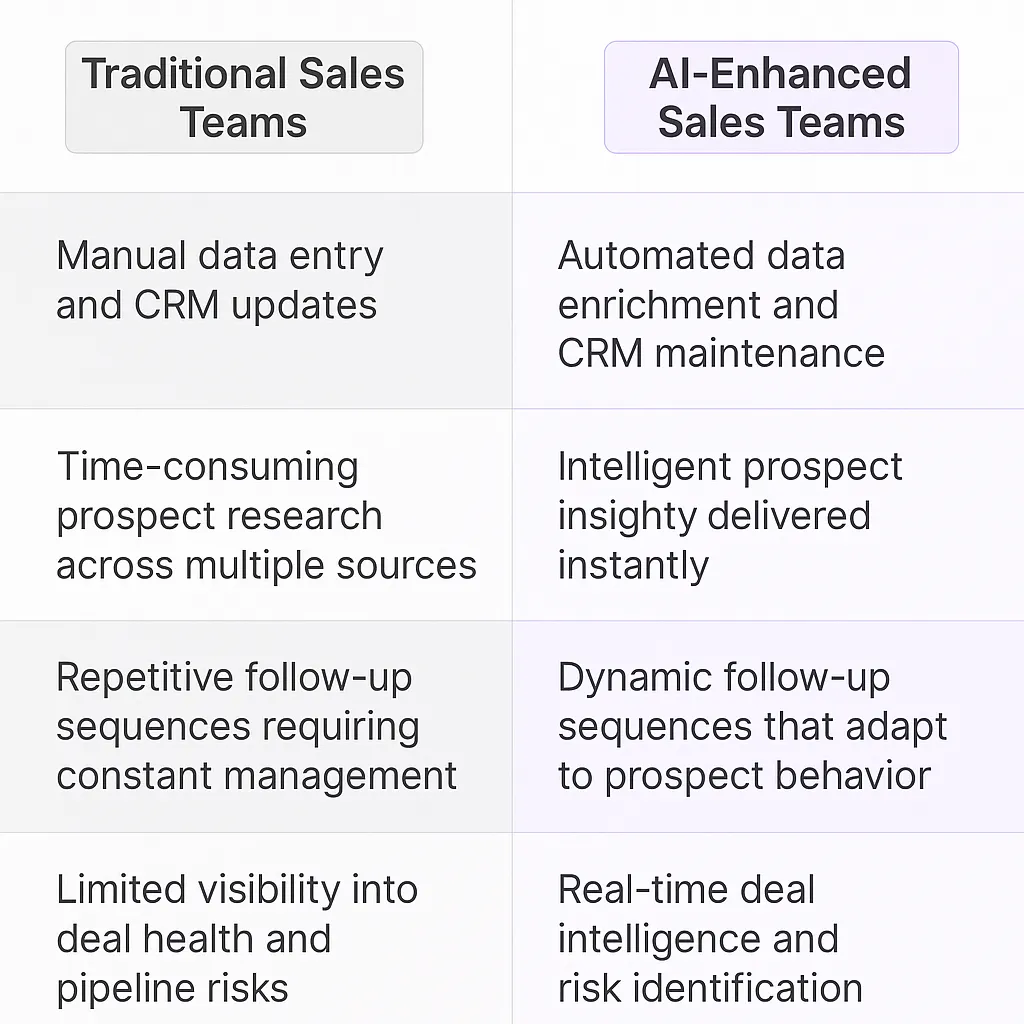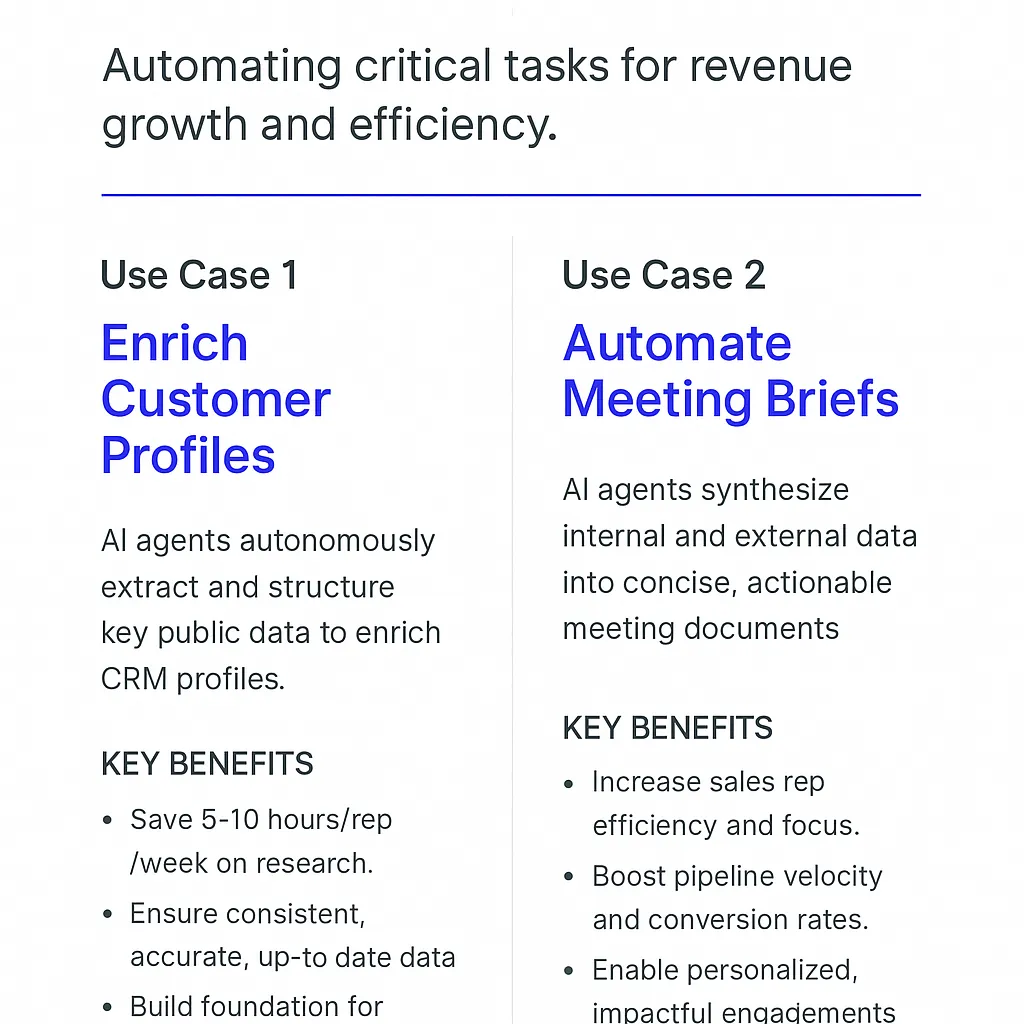Close
Close CRM and AI Agents: A Powerful Sales Partnership
What is Close?
Close is a sales-focused CRM platform designed for high-performance teams who need to move quickly and close deals efficiently. The system combines email, calling, and pipeline management into a unified workflow that eliminates context switching and keeps sales teams focused on revenue-generating activities.
Key Features of Close
The platform's core strengths lie in its intelligent lead management, built-in calling and email capabilities, and customizable pipelines. With AI Agent integration, Close transforms into a proactive system that not only tracks sales activities but actively participates in deal progression. The combination creates a multiplier effect where each sales rep can effectively handle more opportunities while maintaining high-quality prospect engagement.

Benefits of AI Agents for Close
What would have been used before AI Agents?
Sales teams traditionally relied on manual data entry, repetitive follow-ups, and time-consuming prospect research. Sales reps spent countless hours updating CRM records, writing personalized emails, and trying to figure out the best time to reach out to leads. They juggled multiple browser tabs while piecing together prospect information from LinkedIn, company websites, and various data sources.
What are the benefits of AI Agents?
AI Agents in Close transform how sales teams operate by eliminating the cognitive overhead of routine tasks. These digital teammates handle the heavy lifting of data enrichment - automatically pulling in relevant company information, social profiles, and contact details that sales reps previously had to hunt down manually.
The real power comes from their ability to learn and adapt to your sales motion. They analyze successful deals and engagement patterns, then apply those insights to suggest optimal outreach timing and personalized messaging approaches. This isn't just about automation - it's about augmenting human capabilities with pattern recognition at scale.
For sales leaders, AI Agents provide unprecedented visibility into team performance and deal progression. They surface risks early by detecting changes in prospect engagement and highlight opportunities that might otherwise slip through the cracks. The agents can identify which deals need immediate attention based on hundreds of signals - something even experienced sales managers struggle to do consistently.
Most importantly, AI Agents handle the mundane aspects of sales operations while preserving the human elements that actually close deals. Sales reps can focus their energy on building relationships and handling complex negotiations, rather than getting bogged down in administrative tasks. This creates a multiplier effect where each rep can effectively manage more opportunities without sacrificing quality of engagement.
The network effects are particularly powerful - as more teams use AI Agents in Close, the system gets smarter at predicting what works across different industries and sales contexts. This creates a continuous improvement loop that makes every sales team more effective over time.

Potential Use Cases of AI Agents with Close
Sales Pipeline Management
AI agents transform how sales teams interact with Close CRM by automatically categorizing and prioritizing leads based on engagement patterns and historical conversion data. They monitor pipeline velocity, flag stalled deals, and provide actionable insights on which opportunities need immediate attention.
Smart Follow-up Sequences
The integration of AI agents with Close enables dynamic follow-up sequences that adapt based on prospect behavior. When a lead shows specific engagement patterns, the AI agent can modify outreach timing and suggest personalized messaging that resonates with the prospect's demonstrated interests.
Deal Intelligence
AI agents analyze conversation transcripts, email threads, and interaction history to surface critical signals about deal health. They identify buying intent indicators, potential objections, and competitive mentions, giving sales reps a strategic advantage in moving deals forward.
Activity Automation
Sales leaders can offload routine CRM updates to AI agents that automatically log calls, categorize email interactions, and update contact information. This creates a self-maintaining system where data entry becomes invisible, letting reps focus on building relationships.
Revenue Forecasting
By analyzing historical deal patterns and current pipeline metrics, AI agents provide increasingly accurate revenue projections. They identify deals at risk, suggest pipeline adjustments, and help sales leaders make data-driven decisions about resource allocation.
Customer Intelligence Gathering
AI agents continuously monitor public data sources to enrich Close contact profiles with relevant company updates, funding news, and market changes. This intelligence helps sales teams spot expansion opportunities and anticipate customer needs.
Meeting Preparation
Before important calls, AI agents compile comprehensive briefing documents pulling from Close interaction history, deal notes, and relevant company research. Sales reps enter conversations armed with context and talking points that drive deals forward.
Performance Analytics
AI agents analyze rep performance data to identify winning patterns in successful deals. They surface insights about optimal outreach timing, messaging effectiveness, and deal velocity factors that can be replicated across the sales team.
The integration of AI agents with Close represents a fundamental shift in how sales teams operate. Rather than just managing data, these digital teammates actively participate in deal progression, turning CRM from a system of record into an intelligent force multiplier for sales effectiveness.

Industry Use Cases
Close AI agents are transforming sales and revenue operations across multiple sectors, creating new possibilities for how teams engage with prospects and manage customer relationships. The integration of AI into sales processes isn't just about automation - it's about augmenting human capabilities in ways that were previously impossible.
Sales teams are discovering that AI agents can handle complex tasks that traditionally required significant manual effort. From startups to enterprise organizations, these digital teammates are becoming essential partners in driving revenue growth and improving customer engagement. The real power lies in their ability to adapt and learn from different industry contexts while maintaining consistency in execution.
What makes Close AI agents particularly compelling is their ability to operate within industry-specific frameworks while adapting to unique organizational needs. They're not just following scripts - they're learning from interactions, understanding industry nuances, and evolving their approaches based on real-world feedback.
The following industry examples demonstrate how Close AI agents are being deployed in real-world scenarios, showcasing their versatility and impact across different business models and market segments.
AI Agents Transform Software Sales Development
Software sales development teams face intense pressure to qualify leads quickly while maintaining genuine relationships. The traditional approach of manually researching prospects, crafting personalized outreach, and managing follow-ups simply doesn't scale - especially when SDRs need to hit 100+ touchpoints daily.
Close AI Agents radically shift this paradigm by functioning as digital teammates that handle the heavy lifting of sales development. When integrated with Close's CRM, these AI agents can analyze prospect data, identify high-value opportunities, and execute personalized multi-channel outreach campaigns with minimal human oversight.
For software companies, the impact is profound. AI agents can scan technical documentation, case studies, and competitive intelligence to craft highly relevant outreach that speaks directly to each prospect's specific needs and pain points. They detect buying signals across email responses and call transcripts, automatically adjusting follow-up cadence and messaging to optimize engagement.
The results are compelling: SDR teams using Close AI Agents report 3-4x higher qualified opportunity creation while reducing manual prospecting time by 60%. This allows human sales developers to focus on high-value activities like discovery calls and relationship building with key accounts.
Most importantly, the AI maintains consistency in voice and approach across all touchpoints - something that's incredibly difficult to achieve across large SDR teams. The system learns from successful interactions to continuously refine its engagement strategy, creating a powerful feedback loop that improves conversion rates over time.
For software sales leaders looking to scale their SDR operations without sacrificing quality, Close AI Agents represent a fundamental shift in how teams can approach prospecting and qualification at scale.
AI Agents Transform Real Estate Deal Flow
Real estate firms face a unique challenge - they need to process hundreds of property inquiries while delivering white-glove service to high-net-worth clients. The traditional model of manually qualifying leads and coordinating showings creates major bottlenecks that limit deal flow.
Close AI Agents are rewriting this playbook by operating as specialized digital teammates for real estate teams. These AI agents excel at the complex dance of qualifying serious buyers, coordinating property tours, and maintaining engagement across months-long sales cycles.
The technology shines brightest in luxury real estate, where discerning clients expect rapid, sophisticated responses at any hour. AI agents analyze detailed property specifications, location data, and client preferences to match prospects with relevant listings. They field initial inquiries via email and SMS, gathering key qualifying information like budget, timeline, and specific requirements.
What makes this particularly powerful is the AI's ability to maintain detailed context across every interaction. When a prospect mentions they're looking for "south-facing windows with ocean views," that preference gets logged and factored into all future property recommendations. The system builds rich prospect profiles over time, enabling increasingly personalized interactions.
Real estate leaders using Close AI Agents report 40% more qualified showings and a 50% reduction in time spent on initial prospect screening. The AI handles routine follow-ups and nurturing, freeing agents to focus on high-value activities like property tours and offer negotiations.
The system's ability to scale personal attention creates a compelling advantage in competitive markets. While traditional firms might take hours or days to respond to inquiries, AI-enabled teams provide instant, relevant engagement 24/7. This responsiveness translates directly to increased deal flow and faster sales cycles.
For real estate leaders looking to scale their operations while maintaining service quality, Close AI Agents represent a fundamental shift in how teams can handle prospect engagement and deal qualification.
Considerations and Challenges
Implementing AI agents within Close CRM requires careful planning and strategic consideration. The integration process presents both technical hurdles and operational adjustments that teams need to navigate.
Technical Challenges
Data quality stands as a primary technical obstacle. Close AI agents rely heavily on historical sales data, conversation logs, and customer interactions. Organizations often discover their data is fragmented, inconsistent, or lacks proper labeling - creating potential blind spots in the AI's decision-making process.
API rate limits and system integration complexities can bottleneck performance. Teams must carefully architect their implementation to handle high-volume data processing without disrupting existing workflows or exceeding platform limitations.
Operational Challenges
Sales teams typically develop specific processes and rhythms over time. Introducing AI agents requires recalibrating these established patterns. Sales reps may need to modify how they log activities, update records, and manage their daily workflows to maximize the AI's effectiveness.
Training and adoption present another significant hurdle. Sales professionals must learn to collaborate effectively with their digital teammates, understanding both their capabilities and limitations. This learning curve can temporarily impact productivity as teams adjust to new interaction patterns.
Privacy and Compliance
Customer data protection demands rigorous attention when deploying AI agents. Organizations must ensure their implementation adheres to industry regulations like GDPR and CCPA. This includes establishing clear data handling protocols and maintaining transparent communication with customers about AI involvement in their interactions.
Performance Monitoring
Measuring AI agent effectiveness requires new metrics and monitoring systems. Traditional sales KPIs may need refinement to accurately capture the impact of AI-enhanced workflows. Teams should establish baseline metrics before deployment and implement robust tracking mechanisms to evaluate ROI and identify areas for optimization.
AI-Powered Sales Evolution: A New Era of Revenue Growth
The integration of AI Agents with Close represents a fundamental shift in sales operations. Rather than just automating tasks, these digital teammates augment human capabilities in ways that meaningfully impact revenue growth. As the system learns from more interactions across different sales contexts, its ability to drive successful outcomes continues to improve. Organizations that embrace this technology gain a significant competitive advantage through enhanced deal intelligence, consistent execution, and scalable personalization.













